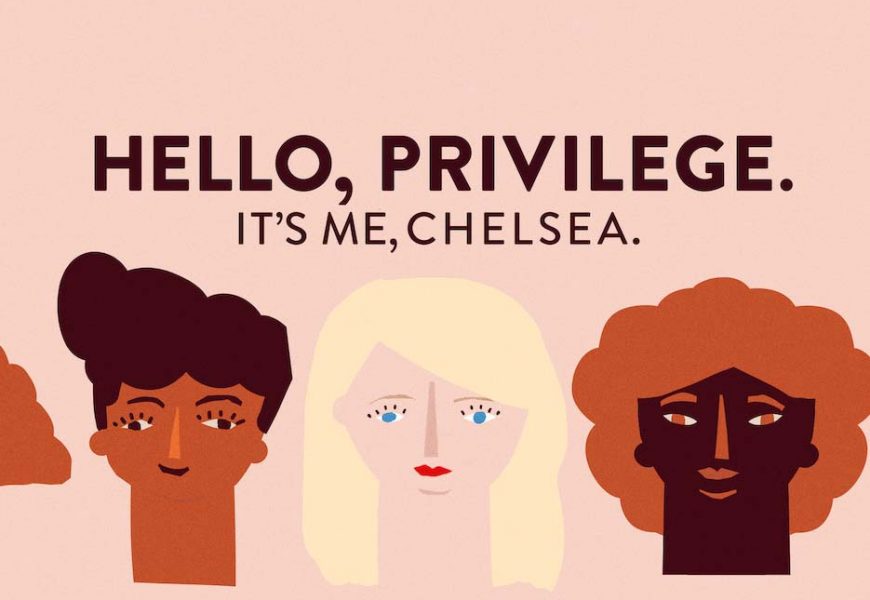Chelsea Handler, an American comedian known for her late-night talk show and various series on Netflix, attempts to apologize for the Netflix comedy-special Uganda Be Kidding Me, in her latest documentary: Hello, Privilege. It’s Me, Chelsea. In Uganda Be Kidding Me—Live, Handler crosses a line through her “comedic” attacks toward people of color, disabled individuals, and members of the LGBTQIA community. The crude and vulgar nature of Handler’s comedic acts nearly slap you in the face. So naturally, Hello, Privilege. It’s Me, Chelsea feels like another attempt by a white celebrity to rewrite her wrongs and reconstruct herself as a socially aware activist.
Handler begins her documentary with a series of clips from her repertoire of comedic acts, starting at the beginning of her career, to Uganda Be Kidding Me—Live. Does Chelsea Handler believe that creating this documentary offers an opportunity for voices of color to be heard when it comes to structural socio-economic disadvantage? Most likely. However, her binary construction of race and profit from the marginalization of a racialized group makes her approach to understanding white privilege in the United States extremely problematic.
Handler’s perpetuation of the binary classification of race in the United States is perhaps the most problematic aspect of the documentary. She ignores several important aspects of identity and how they are socially constructed. For instance, Handler does not how racial categorization occurs in Latin America, the way racialization in this country is in part due to forced racial identification, nor how individuals are racialized based on their linguistic identities. What about those who identify as Latinx and who do not fit the binary construction of race in the United States, but face severe socio-economic consequences due to racial categorization? What about individuals who don’t have phenotypic features that are associated with particular racial categories, but are still marginalized based on the construction of whiteness? Why does Handler only discuss black and white bodies?
Celebrities have a complicated relationship with activism and social change. Handler uses her high level of power and influence to attempt to create a discussion about her own white privilege. The entire documentary creates a conversation about how Handler herself seeks to change her perspective of whiteness in the United States. Handler uses the documentary as a public act and quest to re-establish her moral position on race.
The documentary begins with Handler asserting her Jewish identity and the ways in which she was rewarded for “hustling” in Hollywood. In an attempt to posit symmetry between the experiences of Jewish and black people, Handler uses her Jewish identity throughout the entire documentary to attain empathy for the one aspect of her identity that has historically faced extreme oppression. However, she unfairly universalizes the experiences of black and Jewish people as the same kind of suffering. She discusses the “many nuances” of what it means to be black, but only deconstructs broad privileges of what it means to be white in the United States. Handler states, “I’m clearly the beneficiary of white privilege, and I want to know what my personal responsibility is, moving forward.”
Handler strategically interviews and highlights many different groups in an attempt to create a credible perspective. At an open mic night with a USC student group, the documentary highlights perspectives of several students of color. One student states, “This rabbit hole goes deep… deeper than a documentary.” Another states that she’s “really embarrassed to be here… this is just another example of white privilege.”
While Handler verifies her privilege in the creation of the documentary, she ultimately concludes that “black people are sick and tired of being asked questions about white people’s problems… it’s a white person’s problem.” She then uses various statements from the students, backed by activist and author Tim Wise, to shape the rest of the documentary.
In order to provide a contrast to the perspectives Handler introduces throughout the documentary, she interviews a group of Republican women from Orange County, California. In Somerville, New Jersey, she visits an ex-boyfriend from high school who faced more than 10 years of incarceration. If anything, Handler explains an unfair system through the comparison of herself to her black partner. She explicitly states that because of the system in place, she clearly faced many benefits. Yet, in introducing her ex-boyfriend, Tyshawn, a man she chooses not to see for 25 years, it feels as though Handler is forced to make an obscure connection in order to create an intersection of her life as a celebrity with black lives.
Handler clearly makes the argument throughout the documentary that discussions of whiteness in the United States need to occur between white people, that white people must hold each other accountable for checking their privilege, and that ally groups should advocate in all spaces for racial justice. While she does offer a platform for black voices to be heard, ultimately, one ought to question who this documentary is really for. Afterall, Handler could process her feelings about whiteness with other white people in her life, not just people of color, but because she is a benefactor of streaming for a largely white audience, she attempts to dismantle white privilege at the cost of people of color and their participation in the documentary.
The conclusion of the documentary is also troubling. Clips praising Handler for her inspiration to establish this conversation and applaud her desire to understand her white privilege take up the last five minutes of the documentary. Many have, and will continue to, admire Chelsea Handler for Hello, Privilege. It’s Me, Chelsea and for boldly disregarding her role as a comedian to discuss serious structural issues in the United States. Yet, if one analyzes this 64-minute film with a critical perspective – one that seeks a true understanding of whiteness in the United States – one must acknowledge that Handler’s film is neither fully engaged nor committed to the issues it attempts to discuss. •










